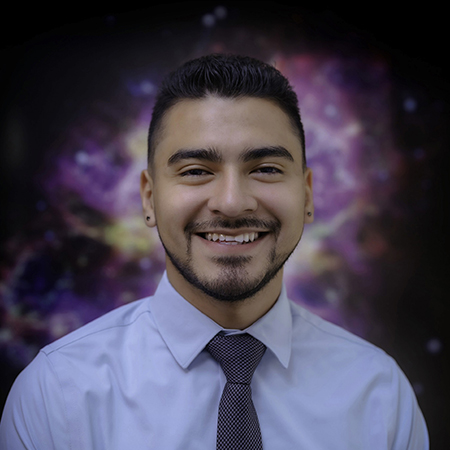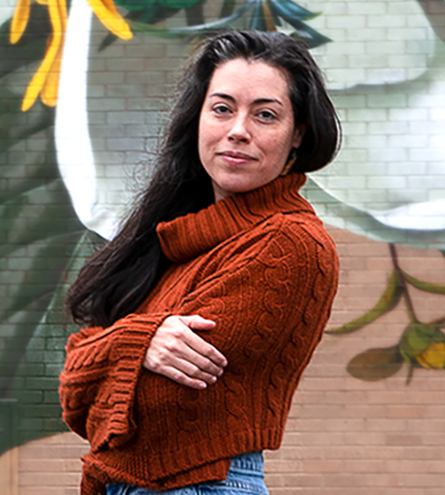Campus News
Celebrating the success of a human-centered approach to supporting emerging scientists
Graduate school admissions, NSF Graduate Research Fellowship awards, and American Astronomical Society honors mark a banner year for UCSC’s Lamat Institute.




In a remarkable journey fueled by natural curiosity, keen insight, ambition, and determination, Miguel Montalvo Hernandez, a first-generation college student from El Salvador, set his sights on a future in the sciences. In 2020, as a student at Diablo Community College seeking to gain invaluable undergraduate research experience, he applied—and was accepted —to UC Santa Cruz’s Lamat Institute. Today, Montalvo Hernandez stands proudly as a UC Berkeley alumnus, having obtained a degree in engineering physics. His journey continues this fall as he embarks on a new chapter at Princeton University, where he will pursue a Ph.D. in astrophysics.
When reflecting upon his achievements, Montalvo Hernandez attributes the resources and support he received from UCSC’s Lamat Institute as being pivotal in helping him achieve his goals.
“Lamat helps students from nontraditional backgrounds, historically marginalized communities, and community colleges, to get the research experience and resources that we need for getting into a graduate program in astrophysics.” he said. “This is really important since historically the field has been mainly male and white-dominated—as reflected by the current demographics of university professors across the country and Nobel Prize winners.”
Celebrating Accomplishments
Lamat, which means star in the Mayan language, supports community college students and other undergraduate students seeking research opportunities on their path toward graduate school in STEM.
Lamat provides opportunities for early career scientists to engage in novel research and creates healthy spaces for scientific inquiry for students by focusing on effective mentoring, which can instill a sense of belonging, mitigate the impacts of negative organizational climates, and aid in performance and retention. Lamat’s comprehensive mentoring training empowers mentors and mentees to co-develop a transformative learning space that prepares and inspires mentees for graduate study.
Lamat increases participants’ competitiveness for graduate programs and prepares them for the STEM workforce more broadly by providing intensive research instruction through summer internships, a winter computational boot camp, academic counseling and mentoring, astronomy science workshops, and social justice discussions. The support system extends beyond the summer program—once students are part of it, Lamat continues supporting them through graduate school and beyond.
The program is celebrating an impressive year.
- Montalvo Hernandez is one of seven Lamat alums who will start graduate school in the fall, representing a 100 percent acceptance rate this year by Lamat applicants at a time when getting into graduate school is more competitive than ever. UC Santa Cruz’s astronomy and astrophysics department, for example, received 400 applications in 2023—double the number received in 2022—for eight graduate spots.
- Five Lamat alumni were awarded NSF Graduate Research Fellowships (GFRP), which recognize and support outstanding graduate students who demonstrate the potential to be transformative scientists and engineers; three of the five Lamat GRFP awardees are community college transfer students. NSF awarded just 63 fellowships in astronomy.
- Lamat was well-represented at the American Astronomical Society in 2023. Four Lamat students received speaker awards from the AAS this year; Montalvo Hernandez received the prestigious Chambliss Astronomy Achievement Student Award.
“We can’t have the best science until all voices are at the table,” says Enrico Ramirez-Ruiz, professor of astronomy and astrophysics at UC Santa Cruz and Lamat founder and executive director.
“The interface between scientific excellence and social justice go hand in hand,” he says. “There’s so much talent out there that’s not being supported in our society. This (the program’s success) is a clear illustration that when those individuals are supported thoughtfully, their voices are amplified, and they are given a platform to showcase their talents, they achieve things an order of magnitude greater than other students. You know, you are six times more likely to get an NSF grant if you are a Lamat fellow—that is kind of amazing.”
Ramirez-Ruiz applauds this year’s accomplished Lamat alums for their perseverance during the pandemic. Lamat ran online for two years in an effort to continue to support its students.
“I was afraid that because of COVID I wasn’t going to be able to do it (Lamat),” says Montalvo Hernandez who had attended a Lamat bootcamp session in January 2020 in preparation for the summer program. “But they (Lamat) moved online and it was great.”
Pivoting to online services during the pandemic is one example of how the Lamat team—led by managing director Deana Tanguay—continues to reinvent the program to best support students.
“Deana’s vision of leadership and support, all the students you talk to will say how much support they’re getting from her and the team,” Ramirez-Ruiz says. “Lamat is constantly trying to find better ways to support the students regardless of the situation. We’re not resting on our laurels.”
Full circle
Since its founding in 2009, 129 students have completed the Lamat Institute. Seventeen students are currently participating in the 2023 program. Lamat alums, several of whom are now faculty, give back to the program. Melinda Soares-Furtado (College Nine ’14, physics), now a NASA Hubble Fellow at the Department of Astronomy at the University of Wisconsin-Madison, serves on the program’s advisory board and advises Lamat students on their grad school applications through workshops and one on one coaching.
Soares-Furtado, an early participant in what would become Lamat, says Ramirez-Ruiz was one of the first people who saw potential in her and encouraged her to be aspirational.
“He helped me see that I could think bigger, not necessarily from a place of just achievement but from a place of deep personal fulfillment. And that was, you know, really wonderful and impactful. To become very aligned with a vision—it’s so powerful.”
As a postdoctoral fellow at the UW-Madison, Soares-Furtado says she now tries to do the same thing with her own students, to help them identify their self-authoring narrative, and how she can support and strengthen it. Soares-Furtado will join the faculty at UW-Madison in fall 2024.
“It’s really a deep dive,” she says. “It might be a slower process than you imagine—taking the time to understand a person’s values, dreams, goals, and how that fits into their plans. But it’s absolutely critical.”
Rosa Wallace Everson, a graduate student in UCSC’s Astronomy & Astrophysics Department, finds Lamat’s community-building aspect incredibly important. She’s inspired by the program’s ability to help navigate hidden systems within higher education.
“There’s this additional aspect of community building as well as academic support that is unique to this program. There are a lot of unwritten rules for success inside of academia, that you either learn from the experience of others or you learn through hard knocks and making mistakes. So Lamat tries to create that kind of family environment in a way and teach those sorts of hidden systems and unwritten rules to help empower the students to navigate academia.”
Everson helps Lamat students develop their culminating scientific presentations, providing multiple workshops to give participants tools for creating and presenting award-winning material.
A human-centered approach
Pedro Jesus Quiñonez participated in Lamat in 2021 and 2022 while getting his undergraduate degree at Sonoma State University. He will attend UC Santa Cruz in the fall, pursuing a Ph.D. in astrophysics. He says Lamat’s holistic approach felt like being part of a family.
“Lamat cares about our success and our well-being,” Quiñonez says. “Lamat really helped me in terms of networking—building relationships, building my professional development, building my research experience—which ultimately helped me get to grad school. Without Lamat, I really couldn’t be where I am now.”
He praises Lamat’s social justice workshops saying, “They’re really unique to thinking about the people aspect of research and how academia as a whole treats different groups of people. We can do better to make academia a more welcoming space so we can do more science.”
Ramirez-Ruiz says that creating a sense of community, a sense of belonging—truly bringing one’s whole identity and being valued for who you are—is at the core of the Lamat program.
“A lot of intentionality within Lamat is to catalyze talent and then bring it to UC Santa Cruz,” he says. “It’s incredibly important for us that we are a house. And now, we’re a nationally recognized home for students of color in the country.”
Everson says that it is one of the parts of Lamat that she admires most.
“Lamat is a force for change in the culture of astronomy and astrophysics. It asks the question, ‘What if, instead of climbing over each other to reach our goals, we work together in community, with respect for the land, with respect for others, with tolerance?’ There is space to bring a human-centered approach to not just doing science, but also generating new scientists.”
Lamat is grateful to Julie Packard, the David & Lucile Packard Foundation, the Heising-Simons Foundation, and other generous donors for their support. To learn more about how you can provide transformative research opportunities for community college and undergraduate students, contact Branwyn Wagman, Senior Director of Science Development, at bwagman@ucsc.edu.